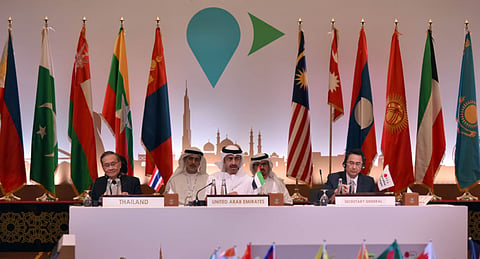The Energy challenge is an engineering challenge
With the same wisdom that its founders had 45 years ago, the UAE continues to lead the way for the clean energy economy

Energy is not a right we are afforded, it is a resource we are responsible for harnessing and preserving.
The founding father of the UAE, late Shaikh Zayed Bin Sultan Al Nahyan, had recognised the importance of environmental stewardship and sustainability and today, the UAE’s diversification strategy stands as a blueprint to help solve the global energy challenges we face.
Shaikh Zayed had said: “Future generations will be living in a world that is very different from that to which we are accustomed. It is essential that we prepare ourselves and our children for that new world.”
Take for example these three facts requiring our immediate and collective action: Access to energy is an economic and global security imperative, critical to sustaining and advancing civilisation; the global population is projected to grow to about nine billion by 2050; and the amount of energy we create today will not be enough to power the world of tomorrow.
At Lockheed Martin, we view this energy challenge as an engineering challenge. In fact, energy is all around us; it just takes innovation, technology and engineering to unlock it.
Clean and renewable energy-generation technologies require investment, both in the form of human capital and in resources.
Alternative energy sources like waste-to-energy, geothermal, solar, hydro, wind, tidal and nuclear energy will only continue to grow if technology enables their growth. Each requires new levels of advanced manufacturing, material science, automation, sensor fusion, coding, systems engineering and much more.
Government, industry and academia must prioritise investments in these areas so that we are pushing the boundaries of innovation while also preparing the next generation of scientists, engineers and mathematicians to deliver new energy technologies we haven’t even imagined yet.
But as we innovate, we cannot look at each technology individually. We need to do more than build new ways to create energy; we must understand how we connect all of these energy sources to work as efficiently as possible.
Gone are the days of the electrical grid being a singular system. To deliver a truly resilient, efficient, affordable and clean grid, we need multiple, complex systems integrating hundreds of distinct hardware and software technologies.
Energy from a mix of traditional and alternative sources will need to be smartly and securely managed and distributed to users. And our buildings, houses and infrastructure must seamlessly integrate power from several sources, while leveraging energy storage systems, automated sensors and demand response technologies to draw only the energy needed and store any excess for later.
From integrating aircraft, spacecraft, mission systems, command and control stations and more, Lockheed Martin has always been the world’s best integrator of complex systems — and our electrical grid is quickly becoming one of the most complex and intricate man-made systems on earth.
No single company or country can take on this challenge alone. It requires partnership. That is why initiatives like the Abu Dhabi Sustainability Week and the World Future Energy Summit are so critical.
Bringing world leaders, policymakers, thought leaders, business leaders, academics, engineers and scientists together to address these challenges is vital to our success.
Here in the UAE, we’ve seen how collaboration sparks innovation. It is just one of the reasons we opened a Centre for Innovation and Security Solutions in Masdar City to facilitate cooperation between every sector of society. We applaud our partners in Masdar for their advancement of the clean energy industry and their support as catalysts for sustainability.
The energy challenge is not a simple one. We need world leaders to support the energy economy and big businesses to invest in new project development. We need small businesses to continue innovating and disrupting the market, and we need local businesses to help understand unique local challenges. We need academics to better inform our thinking and educate our future thought leaders, and we need the world’s brightest engineers and technologists focused on energy innovation.
With the same wisdom that its founders had 45 years ago, the UAE continues to lead the way for the clean energy economy and is providing a clear vision for the future: One where business, government and academia can collaborate effectively and with a common purpose.
Because when we all approach the energy challenge as an engineering challenge, we will be able to build a more sustainable future, drive economic value in the region and strengthen global partnerships for a prosperous tomorrow.
Frank Armijo is the vice-president of Lockheed Martin Energy.



